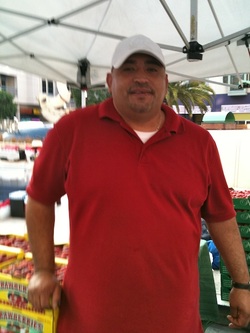
Having spent all my pocket money, I head back across Fillmore to my car in the Safeway parking lot where Doug, my morning coffee-drinking companion at Starbucks, is smoking a cigarette and talking to a friend. When I get to my car, I am unable to leave. Part of me wants to take the strawberries, all the strawberries, and drive away fast, but another part says I got a deal because I am not who I think I am, at least to the strawberry man. And when I imagine myself someone other than me, I am not a person who drives away fast, but a person who shares what comes to me, especially by mistake, with someone else, in this case Doug. I hesitate. I try to pack my strawberries and leave, but I can’t, so I untie the yellow plastic bag and rearrange the berries to fit their three plastic containers. I take one of the baskets to Doug and hand it to him. “For me?” he asks. I nod. Then I get in my car and go home.
I am making the most of my mistaken identity to be someone I really like. Rather than a woman besieged by self-doubt and frequent bouts of self-loathing, I am a woman who is at the strawberry man’s stand each Saturday at the Farmers Market on Fillmore and O’Farrell. This is not a bad person to be. Certainly she is enough on this Saturday morning at 7:30 a.m.
And while to myself I may have been the woman with a surprisingly decent cholesterol level leaving the St. Mary’s Hospital building on Shrader and Fulton, to the blind man trying to go in on Wednesday, I was a godsend. I saw him tapping against the side of the rounded front of the building, unable to navigate the confusing steps. He heard me and asked if this was the building and I said yes and went to him. He positioned himself at my arm, explaining it was his first visit to this doctor and no family member could go with him. We went in and he asked me to find his doctor and I did, checking the listings in the lobby while he waited inside the entrance. Suite 400, right near the door. I reconnected with him and guided him into the office and to the admissions desk, leaving him there as he thanked me with profound gratitude.
And that gratitude was reciprocated because I am pleased to be the person I have just been. This identity is a gift from him. And when I tell my therapist that this encounter has been the high point of my week and she rephrases my words as therapists do, saying I had helped him, I said no. “Help” is not the word I want to interpret what transpired between that blind man and me. The word Help sounds too unequal. For in that transaction between us, I felt given a gift. Let me hear her words reflect that fact. Let me hear her understand how that blind man allowed me to be my best self, an unquestioningly kind person who expected no benefit from right behavior. He allowed me that experience of compassion, an experience I can apply to myself. He knew nothing about the me I think I am. He saw me not at all.
When it comes to self-love, I tend to apply an altogether different standard than the one I use for blind men, strawberry men and coffee-drinking companions who may or may not be homeless. Over the years, in and out of therapy, it hasn’t seemed to matter how many reasons buried in childhood I have accepted as plausible explanations for why I judge myself so harshly and am so unkind to the me I think I am. But examples of compassion do make an impression. Because a blind man needs me, whoever that is, to get to the urologist’s office I know the look of compassion. And I benefit because the strawberry man sees me as someone else. And his daughter is $5 closer to college while Doug goes home with strawberries.
Clearly, expressions of love and compassion don’t rely on identity; they don’t need you to know who you think you are.
 RSS Feed
RSS Feed